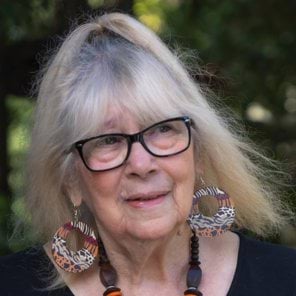
- Inducted:
- 2025
Aunty Lucia Baulch, known as Aunty Lou, is a proud grandmother, health advocate and community organiser. She has dedicated her life to improving the health and wellbeing of Aboriginal people across the eastern suburbs of Melbourne and beyond. For over 60 years, she has led with compassion, strength and cultural wisdom. Her passions are health, wellbeing and preventing family violence.
Born on Gunai Country in 1944 at Orbost and District Hospital in East Gippsland, Aunty Lou is the oldest of 9 children, with 8 younger brothers. She has Monaro Ngarigo and Gunai heritage on her mother’s side, and European heritage on her father’s side.
Aunty Lou grew up in a close-knit family on the edge of the Snowy River with strong ties to the local Aboriginal community. Life was simple, but it was hard. People in her community grew their own food and made what they needed. Aunty Lou helped care for her brothers from a young age and learned the value of service to others, especially Aboriginal women supporting each other through illness and hardship. She was inspired by the strength, wisdom and resilience of women who supported each other at a time when there were few services that would help Aboriginal people.
After she finished high school at the end of 1960, Aunty Lou worked for 2 years at the local Orbost and District Hospital as a nurse's aide. At the age of 18, Aunty Lou left Orbost to pursue her dream of becoming a qualified nurse. She began training at Prince Henry’s Hospital in Melbourne in 1963. There, she was inspired by the compassion and leadership of medical professionals like Colonel Sir Edward ‘Weary’ Dunlop and saw firsthand how health workers could heal both the body and spirit.
After completing her nursing training, Aunty Lou studied midwifery at Box Hill Hospital in 1966. She soon became one of the first Aboriginal maternal and child health nurses in Victoria. Aunty Lou’s professional career included decades of hospital work, in-home nursing and community health service across the outer eastern suburbs. She worked at the Lilydale Bush Nursing Hospital and supported countless new mothers during the early years of parenting.
She has been involved with many important health and community organisations, including:
- Mullum Mullum Indigenous Gathering Place
- the Djelk Dja Action Group
- Boorndawan Willam Aboriginal Healing Service
- The Orange Door
- Australian Catholic University
- Eastern Health
- Victorian Aboriginal Child and Community Agency
- the Victorian Department of Health.
Aunty Lou has been a part of starting and supporting many organisations, but her work has always been focused on what Aboriginal mothers and families need to feel safe and supported. When her children were young, Aunty Lou started support groups for mothers who didn’t have family nearby. The mother’s groups helped women to support each other with childcare, transport, a hot meal or simply friendship.
On top of her work for Aboriginal families and organisations, Aunty Lou has given many years of service as an emergency department volunteer as well as to the St Vincent de Paul Society. She has always believed in helping everyone in her local community.
After officially retiring in the early 2000s, Aunty Lou has remained a full-time advocate and continues to be deeply involved in community life. She is busier than ever, working on boards, in committees and in healing spaces. She attends events, keeps up with the latest health research, and mentors young staff and community leaders. She is often called on by government agencies to advise on Aboriginal health, family violence and wellbeing strategies.
Aunty Lou married John Baulch in 1967 and moved to Mount Evelyn, where she still lives today. Together they raised 2 children in a home surrounded by a thriving garden and a strong sense of community. She is now a grandmother and continues to inspire her family.
Aunty Lou’s legacy is rooted in building culturally safe, self-determined and empowering spaces for Aboriginal people and families. She has always advocated for reconciliation by working alongside non-Indigenous organisations and communities to build understanding and partnership. She has continually pushed for important changes in health practice, such as:
- the introduction of lived experience in program design
- the use of trauma-informed approaches
- mental health and disability inclusion
- dedicated training for family care and support workers.
Aunty Lou’s cultural leadership has supported and inspired many people. She is a respected knowledge holder in areas such as birthing, palliative care and community-based health. She teaches the importance of cultural connection, identity and pride. Through her former involvement with the Yeng Gali Mullum singers, she sang in language and shared healing through music. She believes in the importance of storytelling for reconciliation and is an advocate for Aboriginal traditions of care from birth through to end-of-life.
Aunty Lou’s message to young people is simple but profound:
“Be true to yourself. Know who you are, where you come from, who your family are. Stay connected to your mobs and always keep your ancestors proud of who you are.”
Aunty Lou’s commitment to self-determination and cultural safety has changed countless lives. Her kindness, wisdom and fierce dedication make her a true Elder. Her story is one of quiet strength, trailblazing service and lifelong devotion to her people.
“Think of the wisdom, strength, courage and resilience in each of our stories, which has inspired us to do what we chose to do in our lives. Our communities and younger generations need to hear our stories—and our stories need to be recorded for all people. This is our history.”
Updated

